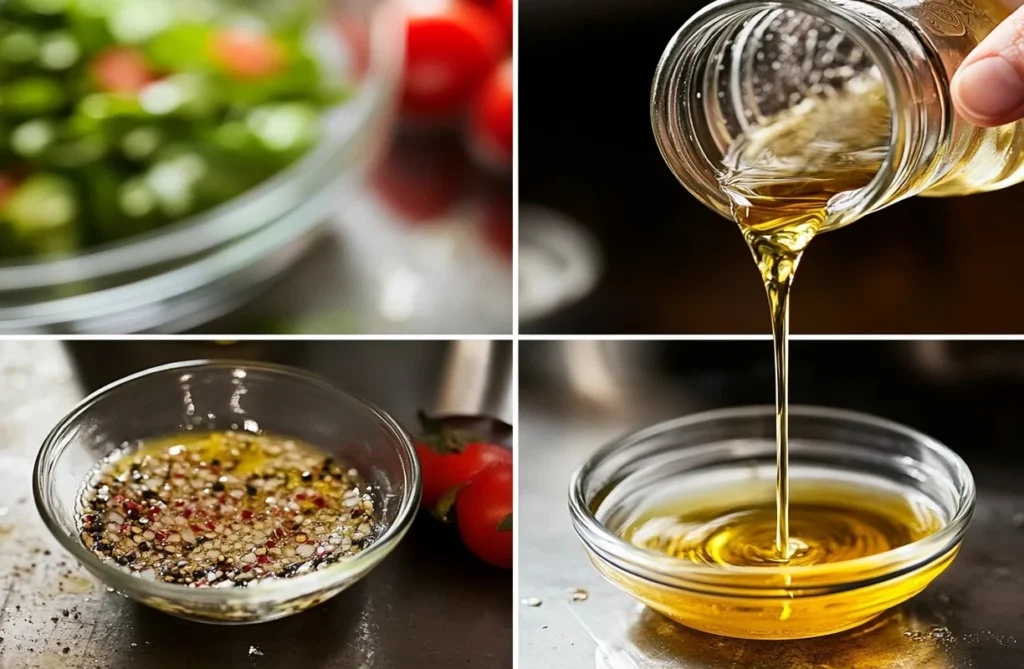When it comes to dishes that truly represent New Orleans cuisine, few can match the charm of New Orleans soaked salad dressing. This tangy and delicious dressing has become a favorite in Southern kitchens, particularly in New Orleans, loved for the way it transforms even the simplest salads into something extraordinary. Furthermore, with its unique combination of ingredients and bold flavors, such as vinegar, herbs, and spices, this dressing stands out as a must-try. In addition, its rich and tangy taste makes it perfect for anyone eager to bring the authentic flavors of New Orleans into their home. Moreover, the balance of its ingredients ensures every bite delivers a delightful burst of flavor. Indeed, this dressing is a testament to the vibrant culinary traditions of the region.
In this article, we’ll take you through the story behind this popular dressing, first, share the ingredients and steps to make it, and finally, offer helpful tips to make sure your version is perfect. Let’s begin this culinary journey and explore this tasty New Orleans tradition together!
What is Soaked Salad Dressing?
New Orleans soaked salad dressing isn’t just another salad topping; it’s a flavorful tradition that has been loved in Southern homes for years. Unlike regular dressings, this soaked salad dressing is made to soak into every ingredient, making each bite full of tangy and spicy goodness.
The Origins of Soaked Salad Dressing
While the exact history of this dressing is unclear, it’s deeply rooted in New Orleans cuisine, which blends French, Creole, and Southern influences. The soaked salad dressing likely evolved from French vinaigrettes but gained a zestier profile with the addition of mustard, garlic, and other bold seasonings.
New Orleans chefs have perfected this dressing by meticulously balancing oil and vinegar ratios. As a result, they have created a texture and flavor combination that feels both luxurious and approachable. Furthermore, this careful attention to detail ensures that the dressing complements a wide range of dishes. Additionally, the harmonious blend of ingredients highlights the creativity and expertise of New Orleans cuisine.Indeed, this dressing is a testament to the vibrant culinary traditions of the region. Consequently, this dressing is traditionally used with crisp lettuce, tomatoes, and onions to create a refreshing side dish or stand-alone starter. Indeed, the combination of these ingredients results in a truly delightful culinary experience.
Why Soaked Dressing is Special
Unlike creamy dressings that coat the surface of the salad, soaked salad dressing penetrates each ingredient. As a result of this method, the flavors blend harmoniously, consequently resulting in a dish that feels marinated and fully integrated The tanginess of vinegar combined with the richness of olive oil ensures the salad stays light but flavorful.
Here’s what makes it stand out:
- Versatility: Works well with various types of salads and even as a marinade.
- Authenticity: A true taste of New Orleans cuisine that brings the spirit of the city to your table.
- Ease of Preparation: Requires only basic kitchen skills and simple ingredients.
How New Orleans Soaked Salad Dressing Complements Southern Cuisine
The New Orleans soaked salad dressing pairs wonderfully with other regional dishes such as gumbo, jambalaya, or po’boys. Moreover, its tangy notes cut through the richness of fried or spiced foods, thereby making it a perfect accompaniment for balanced meals

Ingredients for a Classic Recipe
Firstly, creating the perfect New Orleans soaked salad dressing begins with choosing the right ingredients. Indeed, each component plays a vital role in building the bold, tangy flavor that makes this dressing unforgettable.
Essential Ingredients
- Olive Oil:
Acts as the base for the dressing, providing a smooth texture and a rich taste.
Tip: Use extra virgin olive oil for the best flavor. - Vinegar:
White wine vinegar or apple cider vinegar works best to achieve the tangy characteristic of this dressing. Some recipes use a combination for added depth.
Substitution: Lemon juice can be used for a lighter, citrusy twist. - Dijon Mustard:
Adds a creamy consistency and sharpness that elevates the dressing. Dijon is a key ingredient in achieving the authentic flavor. - Garlic:
Freshly minced garlic brings a robust aroma and taste.
Alternative: Garlic powder can be used if fresh isn’t available, but fresh is highly recommended. - Sugar:
A pinch of sugar balances the acidity from the vinegar, ensuring a well-rounded flavor. - Salt and Pepper:
Enhances the natural flavors and adds a touch of heat. Use freshly cracked black pepper for the best results. - Herbs and Spices:
For example, oregano and parsley are commonly used, while a pinch of red pepper flakes adds heat for those who enjoy spicier dressings
Optional Additions
- Parmesan Cheese:
For a richer, creamier dressing, add freshly grated Parmesan. This ingredient is particularly popular in modern adaptations. - Creole Seasoning:
A quintessential New Orleans touch, this blend of spices adds depth and authenticity to the dressing. - Shallots:
If you want a milder onion flavor, finely diced shallots can be a great addition.
Measurement Guide
Here’s a basic breakdown of proportions for a single serving (adjust based on your needs):
| Ingredient | Quantity |
|---|---|
| Olive Oil | 1/2 cup |
| Vinegar | 1/4 cup |
| Dijon Mustard | 1 tbsp |
| Garlic (minced) | 1 clove |
| Sugar | 1 tsp |
| Salt | 1/2 tsp |
| Black Pepper | 1/4 tsp |
| Oregano (dried) | 1/2 tsp |
| Red Pepper Flakes | Optional pinch |
How to Make New Orleans Soaked Salad Dressing
Now that we’ve covered the essential ingredients, it’s time to bring them together and create this delicious New Orleans soaked salad dressing. The process is straightforward; moreover, with just a few simple steps, you’ll quickly have a tangy and flavorful dressing ready to enhance your salads. In addition, this recipe is easy to follow, ensuring delicious results every time.
Step-by-Step Instructions
- Gather Your Ingredients
First and foremost, gather all your ingredients to get started. By doing this, you’ll ensure a smooth workflow and avoid the risk of forgetting an important component later on. Next, arrange the olive oil, vinegar, mustard, garlic, sugar, salt, and pepper on your counter so that everything is within easy reach. Additionally, double-check your list to make sure you haven’t missed anything before moving on to the next step. - Mix the Dry Ingredients
Begin by combining the dry ingredients in a mixing bowl. Then, add the salt, pepper, sugar, and any dried herbs like oregano or parsley. Mixing these first helps evenly distribute the flavors later. - Whisk in the Mustard and Garlic
This step is indeed crucial for creating a well-balanced and flavorful dressing. Here are a few additional tips to ensure the best results: - Add the Vinegar
Slowly pour in the vinegar while whisking continuously. This helps the mustard and garlic emulsify, creating a smooth base for the dressing. Don’t rush this step, as the acid from the vinegar needs to meld with the other ingredients. - Incorporate the Olive Oil
Gradually drizzle the olive oil into the mixture while whisking vigorously. This step is key to achieving a creamy, cohesive texture. If you pour the oil too quickly, the dressing may separate. - Adjust Seasoning
Once the dressing is fully blended, taste it and adjust the seasoning as needed. If it’s too tangy, add a pinch more sugar. If it needs more zest, sprinkle in some extra pepper or red pepper flakes. - Let It Rest
Allow the dressing to sit for at least 10 minutes before serving. This resting period lets the flavors mingle, creating a more cohesive and robust taste.
Pro Tips for Success
- Consistency Matters: If you prefer a thicker dressing, use a blender instead of whisking by hand. This method emulsifies the ingredients more effectively.
- Double the Recipe: Since this dressing stores well, consider making a larger batch to have on hand for the week.
- Layer Your Salad: To ensure every ingredient is infused with the dressing’s flavor, toss the salad in layers, adding a bit of dressing between each layer.
How Long Does It Take?
This recipe is quick and easy, requiring only about 15 minutes from start to finish. As a result, with such a short preparation time, it’s a fantastic option for busy weeknights or impromptu gatherings.

Tips for Perfecting the Flavor of Your Soaked Salad Dressing
Making the ideal New Orleans soaked salad dressing recipe requires attention to detail, but don’t worry — with a few handy tips, you’ll be a pro in no time. By focusing on the balance of flavors and incorporating small tweaks, you can make this dressing taste just as good as (or even better than!) the ones you’d find in New Orleans.
Achieving the Perfect Flavor Balance
- Taste As You Go
While preparing the dressing, it’s essential to taste after each major step. For example, after adding the vinegar, check the acidity level. Then, as you incorporate olive oil, ensure it’s balancing the sharpness of the mustard and garlic. - Don’t Be Afraid to Experiment
Although the traditional recipe is delicious, you can always tweak it to suit your personal preference. Want it tangier? Add more vinegar. Prefer a hint of sweetness? Increase the sugar slightly. Keep tasting and adjusting until you strike the right balance. - Use Fresh Ingredients Whenever Possible
Freshly minced garlic, high-quality olive oil, and premium vinegar make a noticeable difference in the dressing’s overall flavor. If possible, avoid processed alternatives like pre-minced garlic or heavily refined oils.
Common Mistakes and How to Avoid Them
- Overpowering Garlic
While garlic is a key ingredient, using too much can overwhelm the other flavors. Start with one clove and add more only if needed. - Skipping the Resting Time
Letting the dressing sit for at least 10 minutes after mixing allows the flavors to meld. Skipping this step might leave the dressing tasting unbalanced. - Improper Storage
If you plan to store the dressing, always use an airtight container to preserve its flavor and prevent separation.
Which Salads Pair Best with New Orleans Soaked Salad Dressing?
Soaked salad dressing is versatile, but it truly shines when paired with specific types of salads. Here are a few suggestions:
- Classic Garden Salad
A mix of crisp lettuce, juicy tomatoes, cucumbers, and red onions pairs beautifully with the tangy dressing. Toss the salad gently to ensure every ingredient is infused. - Mediterranean-Inspired Salad
Add olives, feta cheese, and roasted peppers to create a New Orleans twist on Mediterranean flavors. - Grilled Vegetable Salad
The bold flavors of grilled zucchini, bell peppers, and eggplant contrast nicely with the dressing’s acidity. - Pasta Salad
This dressing works as a unique twist on traditional pasta salad, combining the richness of olive oil with tangy vinegar.
How to Serve and Store Your Dressing
- Serving Tips: For a polished presentation, drizzle the dressing over the salad just before serving, or serve it on the side to let guests add their desired amount.
- Storage Suggestions: Store the dressing in an airtight jar in the refrigerator for up to one week. If the oil solidifies, let it sit at room temperature for a few minutes before using.
Image Suggestion:
A colorful bowl of garden salad topped with the dressing, with a jar of dressing on the side for serving.
Frequently Asked Questions (FAQs)
What is the healthiest salad dressing to put on a salad?
The healthiest salad dressing depends on your dietary goals, but homemade dressings like New Orleans soaked salad dressing can be a great option because they allow you to control the ingredients. By using olive oil as the base, this dressing provides heart-healthy fats, while vinegar adds tang without added calories. You can also adjust the amount of sugar or omit it entirely for a lighter version.
What is the most famous salad in the world?
The Caesar salad is arguably the most famous salad throughout the world. Created by Italian-American restaurateur Caesar Cardini in the 1920s, this iconic dish is known particularly for its creamy dressing made with garlic, anchovies, egg yolks, lemon juice, and Parmesan cheese. Furthermore, its universal appeal lies in its rich flavor and satisfying crunch from Romaine lettuce and croutons.
What is Florida salad made of?
Florida salad is a refreshing dish that celebrates the state’s citrus-rich heritage. It typically includes ingredients such as:
- Fresh oranges or grapefruit slices
- Mixed greens like spinach or arugula
- Sliced avocado
- Toasted nuts or seeds (e.g., pecans or almonds)
The salad is often finished with a light citrus vinaigrette made with orange juice, olive oil, and honey, resulting in a bright and zesty option perfect for warm-weather meals. Indeed, the combination of citrus and honey provides a refreshing counterpoint to the richness of the other ingredients
Conclusion
Bring the bold flavors of New Orleans to your kitchen with this New Orleans soaked salad dressing recipe. Not only is it a must-try for anyone who loves tangy and tasty salads, but it’s also incredibly versatile and easy to prepare. Additionally, the recipe is simple to make, works well with many dishes, and reflects the deep cultural roots of New Orleans cuisine. Ultimately, this dressing adds a truly special touch to your meals.
Enjoy a true taste of New Orleans with every bite. Whether you toss it with fresh greens or serve it with grilled vegetables, it’s sure to be a hit. Now that you know the recipe and tips for perfecting it, it’s time to give it a try. Your taste buds—and your guests—will love it!


3 thoughts on “Soaked Salad Dressing Recipe: New Orleans Flavor Made Easy”